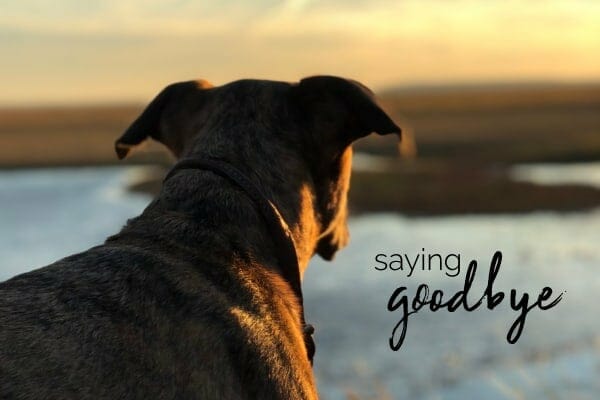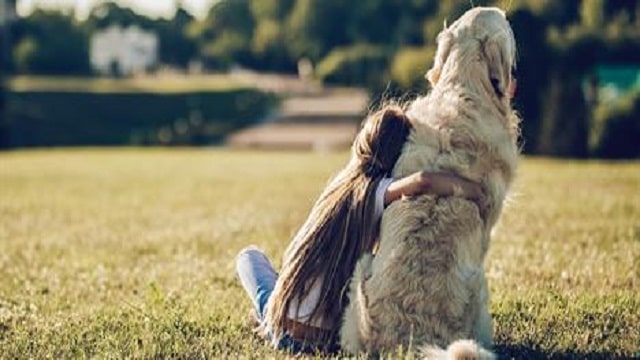Find out how to deal with the loss of your dog so that it doesn’t become a problem in your daily life.
Experiencing the death of our dog is no different than the death of a loved one. Our dog has given us joy, fun times, love, and support, we have cared for him when he was sick or sad and he has also cared for us in similar situations, so his death affects us in a much bigger way than we might expect. People who do not have pets may not empathize with the grieving process that occurs after the death of the animal, and we may not receive the expected support from them, but there are many people who, like you, have suffered greatly with the loss of their great friend and will give you all the understanding you need.
Accepting the death of a dog
When faced with any great loss in our lives, we experience a grieving process, which is made up of five phases: denial, anger, bargaining, depression, and acceptance. The grieving process is natural in human psychology, it occurs in a similar way in all people, although the duration of the phases varies, and it leads us, as we can see, to overcoming the pain, so the first thing we have to take into account and assume is that we have to suffer it, but that we will finally recover from our dog’s pain.
Don’t be sad about feeling bad
In the depression phase we begin to see the reality that our dog will not return, and it causes us deep sadness. In this phase we are more likely to get stuck, but generally, whether it takes more or less time, we get out of it without problems because it is the natural cycle. Otherwise, we should start to put all our resources into action to get out of this depressive state and not let ourselves be carried away by the guilt of continuing our life happily without him.
Finally, acceptance is overcoming, learning to continue our lives as normal but without the negative emotions we had before. We accept that our dog is gone, we remember him with affection and some nostalgia, but without the intense pain, we will even smile when we remember happy memories we had with him.
How to say goodbye to him

The psychology of animals is different from that of people, so one of the things that can help us when we say goodbye is that they don’t have the same idea and anguish that humans have when they know they are going to die and what that means. They may feel, in their final moments, dejected, without strength, but they don’t have the thought that people have of “my time has come,” which causes so much anguish. So, if we know that their death is near, we should give them all our affection and love, as we have always done, and as our dog likes so much: scratching them, saying nice words, petting them… And what they will feel will be pleasant sensations.
Explaining the death of a dog to your children
The normal situation for a child is that the dog is already in the home when he or she is born and is therefore present in all his or her memories. In addition, for a child, the years he or she has lived with the dog are perceived as much longer than for adults, and may therefore be more affected.
The most important thing when dealing with the subject with the child is not to hide the death from them. The way we experience loss in our childhood will be very important when we experience it as adults, so it is very harmful to treat death as a taboo. They have to understand that in life there are loved ones who leave and do not return, that it is part of nature, that each person or animal has their moment, normally when they are very old, and that they will overcome it because they have the love, company, and support of their family. Just like adults, children go through the stages of grief and overcome it. If we do not let them experience these feelings naturally, we can block them at some stage, or create fears that will harm them.
Children must be told the truth from the beginning
Psychological advice
The way in which we overcome the pain of losing our dog depends on each person and their coping skills. What is necessary is to have social support: friends, family or partners, who help us overcome grief, listen to us when we need to vent, sharing the pain together, giving us the emotional security that they are by our side, and understanding that we are suffering… Because for some people our pain may seem exaggerated, if they do not have a pet they do not understand the emotional bond that is established with them and how difficult it is to begin a new stage without them.
You must act regarding the death in the way that you feel, without thinking that you may be exaggerating: pay all the tributes you see to your dog, talk about him, take a few days of rest, but always do things accepting reality and not hiding it.
Apathy, sleep disorders, lack of appetite… are normal because they are part of depressive states, but if you see that it is lasting too long, find a solution. Don’t get stuck in your suffering and start doing distracting activities: go out more, start a hobby or meet people… If you don’t feel better, you will need to receive help from a psychology professional.
Don’t think that you don’t deserve to have a good time because your dog is no longer here. Remember that he wouldn’t have wanted to see you unhappy. We know that animals get sad when they see us in bad shape. Remember that he had a very happy life thanks to the love and care you gave him and that his death is something natural that had to have happened at one time or another. If you are not happy, you will not be able to do the same with your other loved ones.
At first, you may not want to ever have another dog. Every pet is different and can never be replaced, but that doesn’t mean you can’t care for another animal in the future. Wait until you feel strong and comfortable and then calmly consider whether you want a new one, but never try to use this new pet as a substitute for the old one, or as a way to eliminate pain, because that will be counterproductive.

